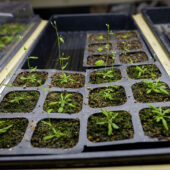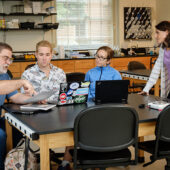$900K NSF grant helps WFU researchers look for the big picture in big data
 Thanks to a $900,000 award from the National Science Foundation, Wake Forest University researchers are examining how plant hormone ethylene affects growth and development of the roots of Arabidopsis thaliana, which is a genetic model used to provide insight into other plants.
Thanks to a $900,000 award from the National Science Foundation, Wake Forest University researchers are examining how plant hormone ethylene affects growth and development of the roots of Arabidopsis thaliana, which is a genetic model used to provide insight into other plants.Categories: Experiential Learning, Research & Discovery

 The WFU Awards and Recognitions briefs celebrate milestones of faculty, staff and students at Wake Forest.
The WFU Awards and Recognitions briefs celebrate milestones of faculty, staff and students at Wake Forest. A new method for capturing radioactive waste from nuclear power plants is cheaper and more effective than current methods, a potential boon for the energy industry, according to new research published in the journal Nature Communications.
A new method for capturing radioactive waste from nuclear power plants is cheaper and more effective than current methods, a potential boon for the energy industry, according to new research published in the journal Nature Communications. In the wake of the deadly mass shooting in Las Vegas, Wake Forest Counseling Professor Samuel Gladding offers suggestions for how to cope with tragedy.
In the wake of the deadly mass shooting in Las Vegas, Wake Forest Counseling Professor Samuel Gladding offers suggestions for how to cope with tragedy. Wake Forest University is convening a group of national thought-leaders across the ideological spectrum to explore what it means to live in a society that is more diverse, polarized, global and virtual than ever before.
Wake Forest University is convening a group of national thought-leaders across the ideological spectrum to explore what it means to live in a society that is more diverse, polarized, global and virtual than ever before. Katy Harriger, author of “The Special Prosecutor in American Politics,” says Congressional investigations are influencing the speed and aggressiveness of special counsel Robert Mueller’s investigation. Harriger is professor of politics and international affairs at Wake Forest University.
Katy Harriger, author of “The Special Prosecutor in American Politics,” says Congressional investigations are influencing the speed and aggressiveness of special counsel Robert Mueller’s investigation. Harriger is professor of politics and international affairs at Wake Forest University. The National Science Foundation recently awarded a $680,000 grant to Wake Forest University Associate Professor of Chemistry Patricia Dos Santos. In addition to funding research that helps scientists better understand life on earth, the grant also enables her to mentor students from other Triad-area colleges.
The National Science Foundation recently awarded a $680,000 grant to Wake Forest University Associate Professor of Chemistry Patricia Dos Santos. In addition to funding research that helps scientists better understand life on earth, the grant also enables her to mentor students from other Triad-area colleges. Wake Forest University has participated in a yearlong process with the Atlantic Coast Conference, partner ACC universities, and the Smithsonian Institution to create the first “ACCelerate: ACC Smithsonian Creativity and Innovation Festival.”
Wake Forest University has participated in a yearlong process with the Atlantic Coast Conference, partner ACC universities, and the Smithsonian Institution to create the first “ACCelerate: ACC Smithsonian Creativity and Innovation Festival.” Wake Forest University is seeking feedback from students, faculty and staff regarding changes to the undergraduate Code of Conduct.
Wake Forest University is seeking feedback from students, faculty and staff regarding changes to the undergraduate Code of Conduct. Science educators at Wake Forest University are testing how automated feedback combined with new one-on-one teaching methods can improve scientific writing from STEM undergraduates – and result in better explanation of research to the public.
Science educators at Wake Forest University are testing how automated feedback combined with new one-on-one teaching methods can improve scientific writing from STEM undergraduates – and result in better explanation of research to the public.